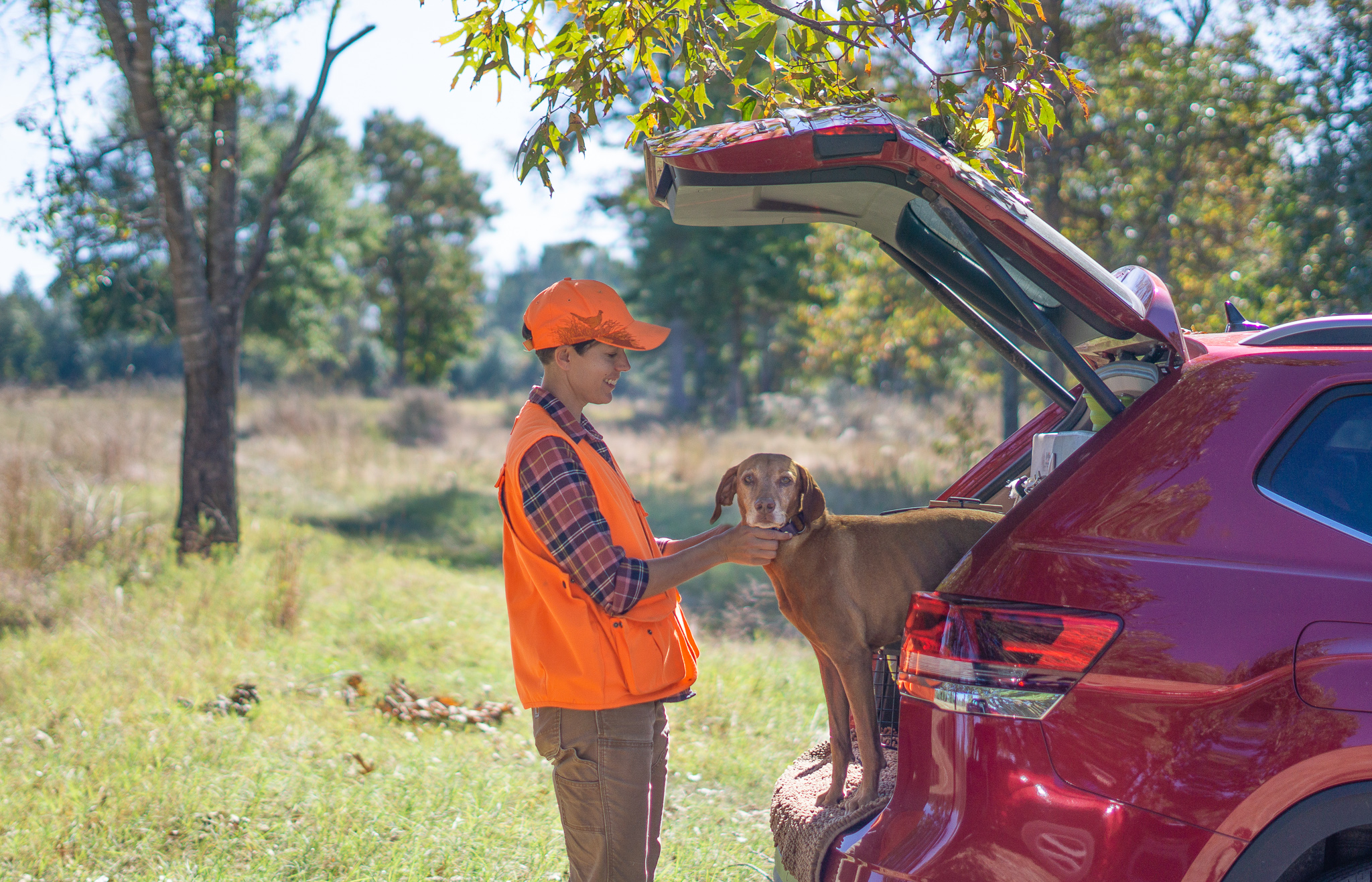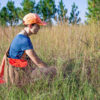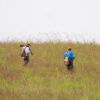Once I got Zara trained to the level of a finished gun dog, I started spending my late fall/winter/early spring seasons attending hunt tests, and later, field trials. I thought I’d write a post about what this lifestyle entails, especially if you are new to the sport and thinking about investing your time and money into it.
Living in North Carolina, the testing and trialing season typically starts in October and runs through the end of March, with a few events in early April that are a little north of where I live. I’m pretty lucky, because if I wanted to, I could attend a hunt test or field trial nearly every weekend for six months without having to travel more than 6 or 7 hours. Most events are within 3 hours. I know other parts of the country have varying test/trial seasons, largely dependent on weather.
Traveling
If you want to start doing field events with your dog, you are most likely going to be doing a lot of traveling. Obviously, this depends a lot on where you live. There are eight venues within 3.5 hours of where I live. The closest one is an hour away. You may have to travel a greater distance. Regardless, going to field trials or hunt tests is going to involve many miles on the road. You’ll probably rack up a lot of miles on your car, depending on how many events you go to and how far away they are. I bought a new car in 2020. In the first year, I put 25,000 miles on it. That is far above the nationwide average of 15,000 miles per year. A lot of the miles were driving to training grounds, but plenty were for attending hunt tests and field trials too. I would definitely recommend having a reliable vehicle that you can safely transport your dogs and gear. One that’s fuel-efficient is ideal, too.
Since most hunt tests are two-day events and a lot of field trials are three-day events, you will inevitably have to spend the night near the grounds if you don’t live close by. If I’m going to a two-day event and it’s 90 minutes away or less, I’ll drive back and forth. Otherwise, I will spend the night nearby. A lot of people who get really into this lifestyle have their own RVs or horse trailers with living quarters. This is especially true of people who participate in field trials. This allows them to stay on the grounds of the event, which is very convenient. Most venues allow camping, although some don’t have hookups. I don’t own a camper and I’m not in the position to purchase one right now. In the past, I’ve always found hotels or Airbnbs near the event venues and stayed overnight there. Unfortunately, most field trials and hunt tests are in the middle of nowhere and there are often not a lot of great overnight accommodations nearby.
You often must drive at least 20 or 30 minutes to find somewhere to stay, and even then, the quality is not always great. I don’t need somewhere fancy to stay, but it does need to be dog friendly, safe, affordable, and not a complete dump. I’ve had decent luck with some of the budget to mid-range hotel chains like Quality Inn, La Quinta, and Comfort Inn. On the other hand, I’ve stayed at several Days Inn motels that I would not go back to, because they were rundown and felt unsafe.
Airbnbs can be a better option, and usually they are quite nice if you can find them. However, I’ve haven’t always had luck finding small places in these tiny towns. I’m usually traveling alone with either one or two dogs, so I don’t want to spend money on a whole rental house.
Another option that I’m going to try this season is camping in my car. I have a full-size SUV, and if I take Colombo’s crate out, that should give me enough room to stretch out in the back. I’m planning on doing this at a venue this fall I’ve been to in the past. It has a bathroom and a shower on-site, so I figure it will be fine for a few days. Much cheaper and I won’t have to drive back and forth to a hotel/Airbnb.
Cost
If you own a bird dog, especially one that’s involving in hunting or other activities, you probably know that they can be quite expensive. Trialing and testing are not cheap hobbies. Entry fees for AKC hunt tests and field trials typically run about $50–$60 per stake now. If you enter four hunt tests in a weekend, that’s $200+. Then you have to add in the cost of gas, your accommodations, and food. Some clubs will provide food, others don’t. Field trials often do because most people are staying on the grounds the entire weekend. Dinners are often donation-only or included. Some clubs have people bring various dishes to share and have a potluck-style dinner. Breakfast and lunch are usually a reasonable fee. Make sure to check the premium of the event to see what the club will be offering.
If you get into field trials, renting a horse to ride at events or owning a horse is going to be another whole set of expenses, but I’m not going to cover that since I haven’t had any experience with it. But safe to say, that’s not going to be cheap either!
I could write an entire post about the gear you need to run a bird dog, and that adds up quickly. But the main thing I consider when entering tests and trials is the birds I’ll need for training before the event. Bird costs have risen over the past year (hasn’t everything?) and where I live, quail are $5+ each and chukar are $8+ each. You need a good number of birds to make a bird dog, and you often need plenty of birds to fix issues you run into with your bird dog. More on that in the Training section below.
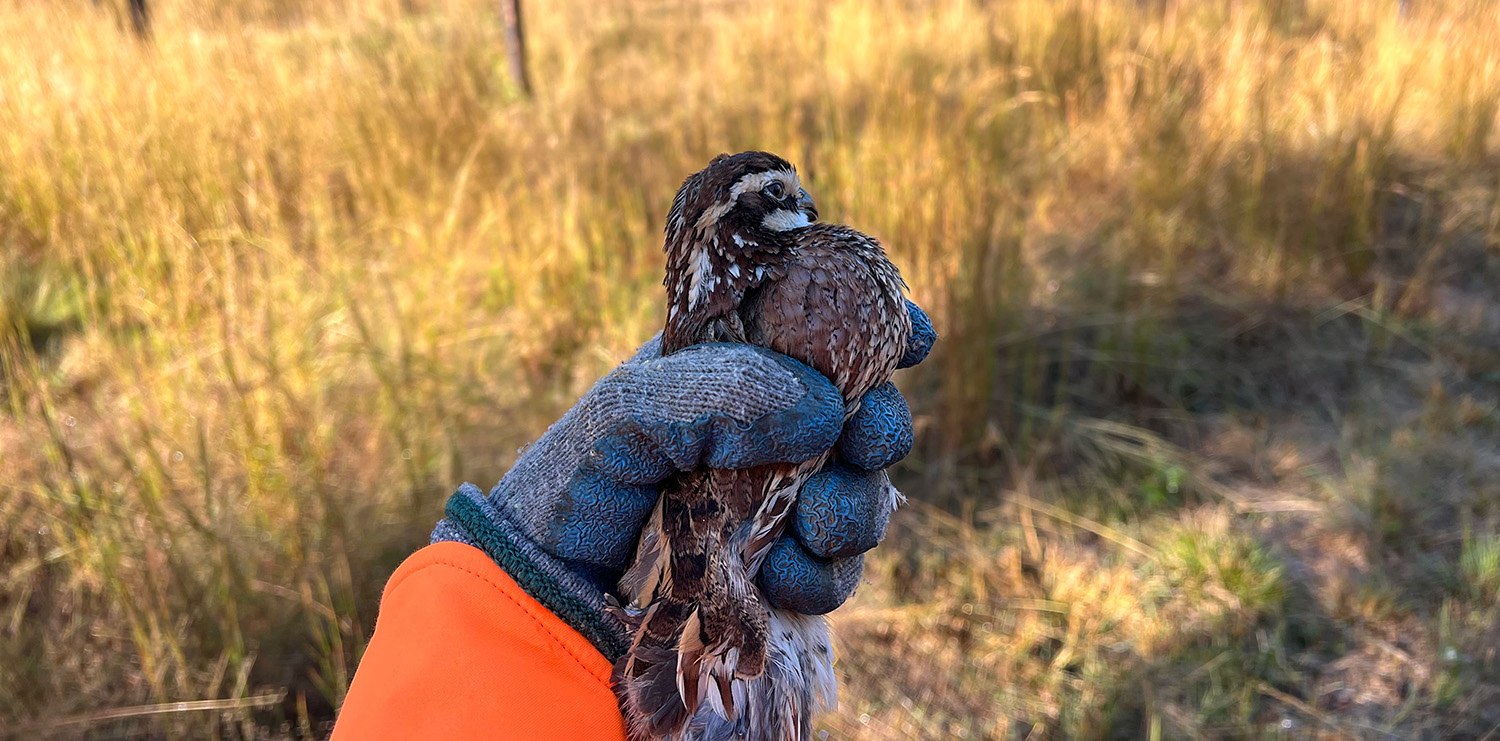
You’ll need plenty of these.
The Test/Trial Weekend
There’s a lot of waiting around during field events. Even though you will likely get a running order ahead of time, it’s never an exact science of when your dog will run, especially if he/she is entered in adult stakes (Senior/Master Hunter or Gun Dog stakes). Most days are long. Events typically start around the time the sun rises (7–8am) and go until dusk (4–5pm). Clubs will usually fill events based on the number of dogs they can run during daylight hours, although it’s possibly some days can be shorter.
If you want to get into these types of events with your dog, you should enjoy being outside a lot. If you have an RV, you’ll have more protection from the elements. But regardless, there’s a lot of standing around (and competing) in hot weather, cold weather, and rainy weather. Be prepared with appropriate clothing, footwear, and lots of extra towels. You can never have too many towels if it’s going to rain the whole weekend!
Your dog will also need a lot of patience for these events. All bird dogs have a lot of energy, but unfortunately, at a field event, your dog is going to spend a lot of time waiting to run. He or she will need to get used to being in a crate or on a stakeout for a long period of time. At most of the weekend tests and trials I’ve been at, there isn’t a place to run your dog off leash when they’re not competing. You have to keep them on a leash. At the national events I’ve attended, there usually is a training field to run your dog off leash since they may only be competing once over the course of several days.
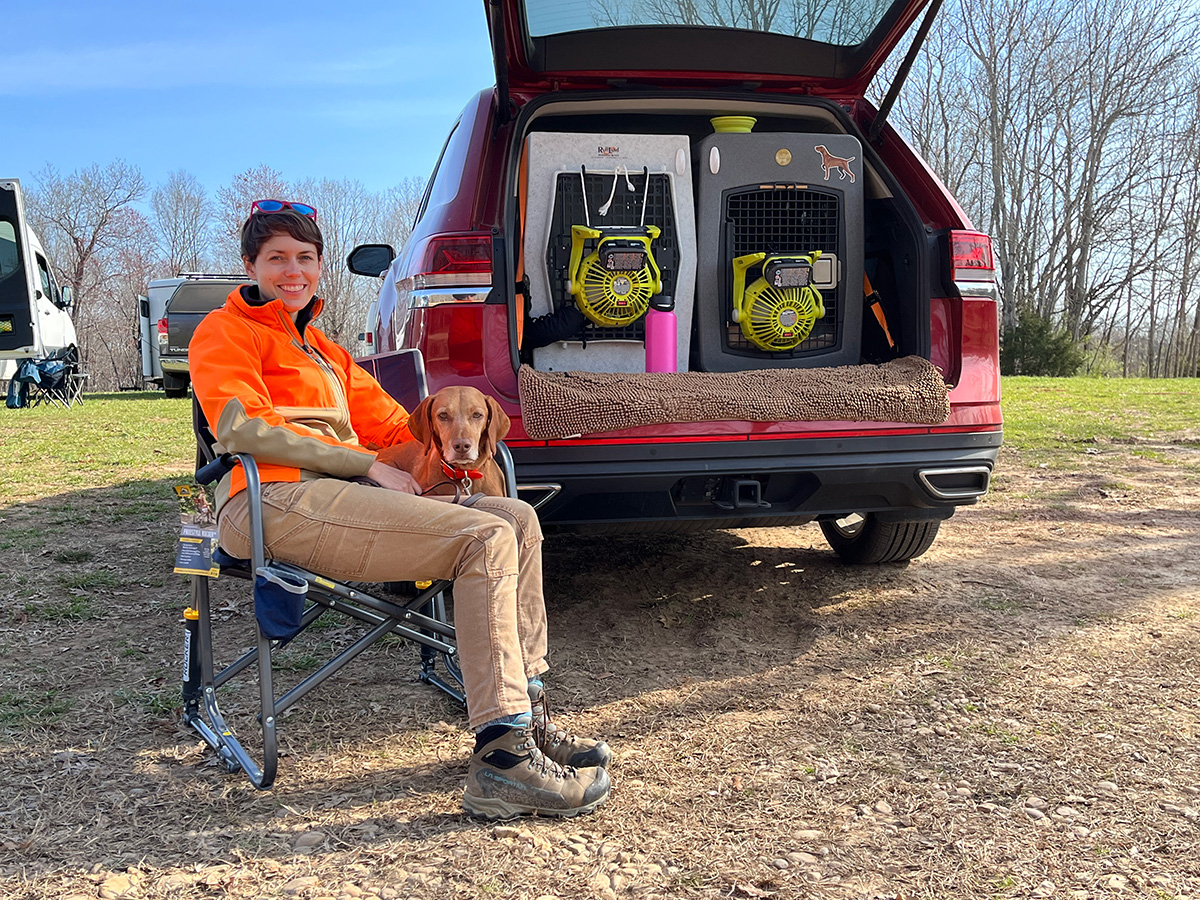
Hanging out at a field trial while waiting for Zara’s turn to run. The weather was pretty nice at this trial, but that’s not always the case.
Training Between Events
You’ll obviously have to do a fair amount of training leading up to your testing season to get your dog prepared. It depends on the dog how much training you’ll need to do between events. Some dogs can run trials or tests in back-to-back weekends and perform well every time. Others may start to get a bit loose when running in new situations and without an electronic collar for corrections. With Zara, I’ve found that it does help to do a refresher session a few days before we’re about to go to an event. Consistency seems to be the key with her. This also gives you a chance to work on any issues you might be having.
For example, when Zara and I ran in Master Hunter tests in 2021, she got picked up at her second test for not stopping to flush on a relocated bird. You better believe that’s what we worked on before the next MH test several weeks later. Because of the need for training in between (as well as the drain of traveling), I often don’t enter back-to-back events. Occasionally I will, but I have never done three weekends in a row.
This Lifestyle is Fun!
Most of this post comes across as cautionary, or as a warning of what to expect when you start doing field trials or hunt test with your dog. But if you love spending time with your bird dog hunting birds, then this lifestyle is a lot of fun! It can also become addicting. I love the excitement of preparing for an event, traveling there, and spending the weekend running my dog. It’s also been great to meet a lot of really nice and knowledgeable people. For more information about field trials specifically, check out the Field Trial Lifestyle podcast.
Have you gotten involved in field trials or hunt tests? If so, what has been your experience? Leave me a comment below!

